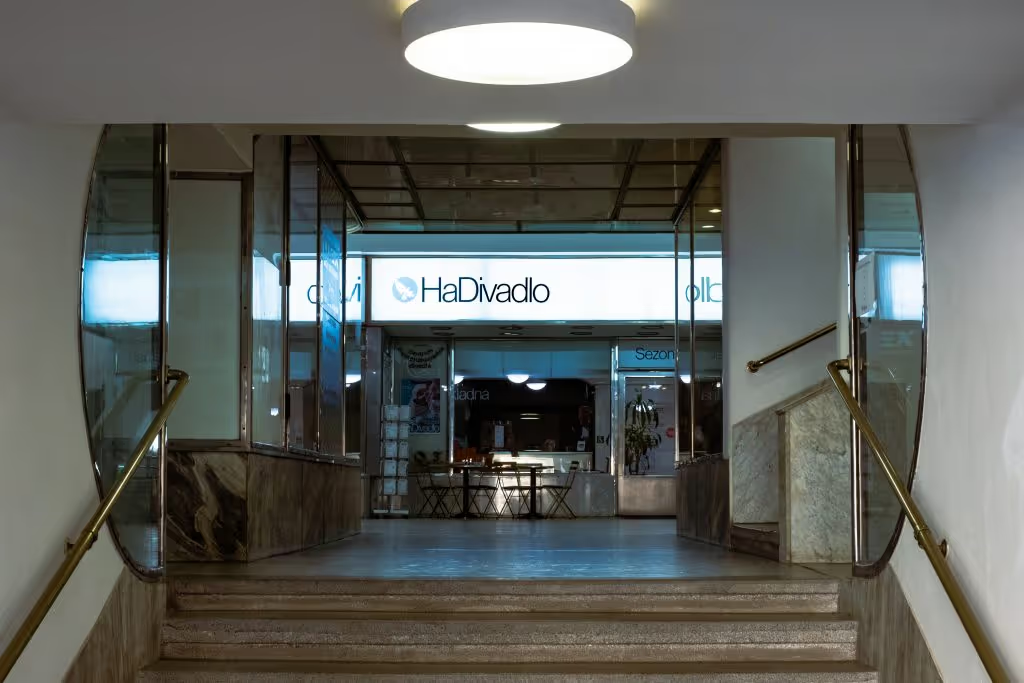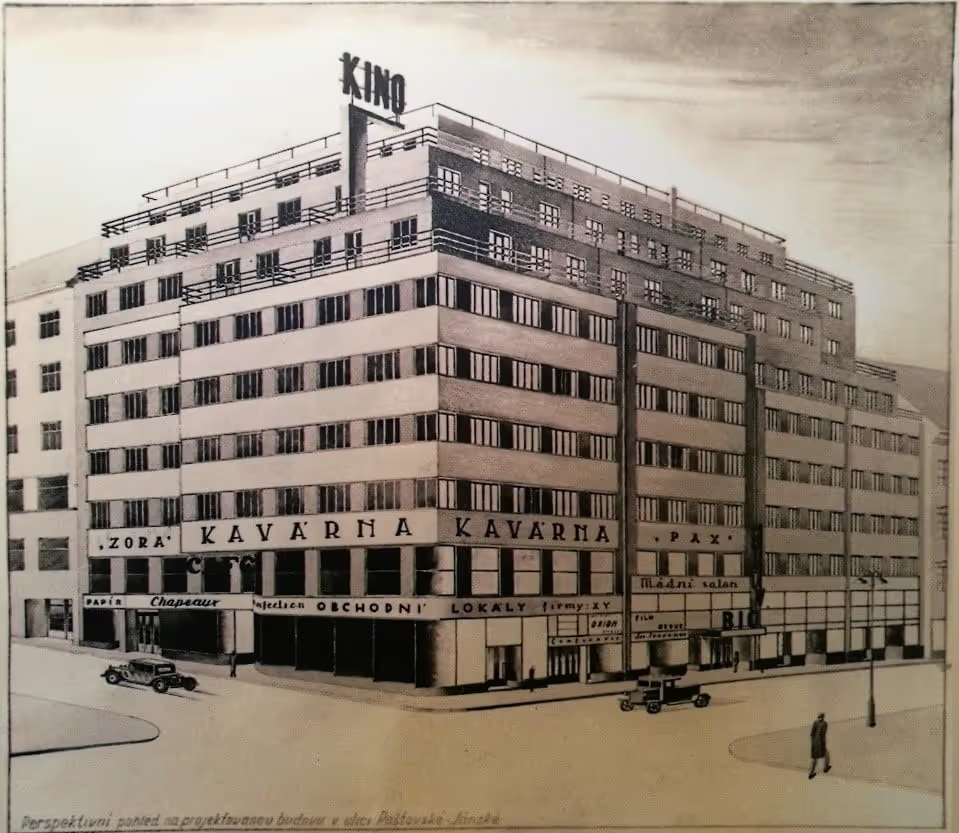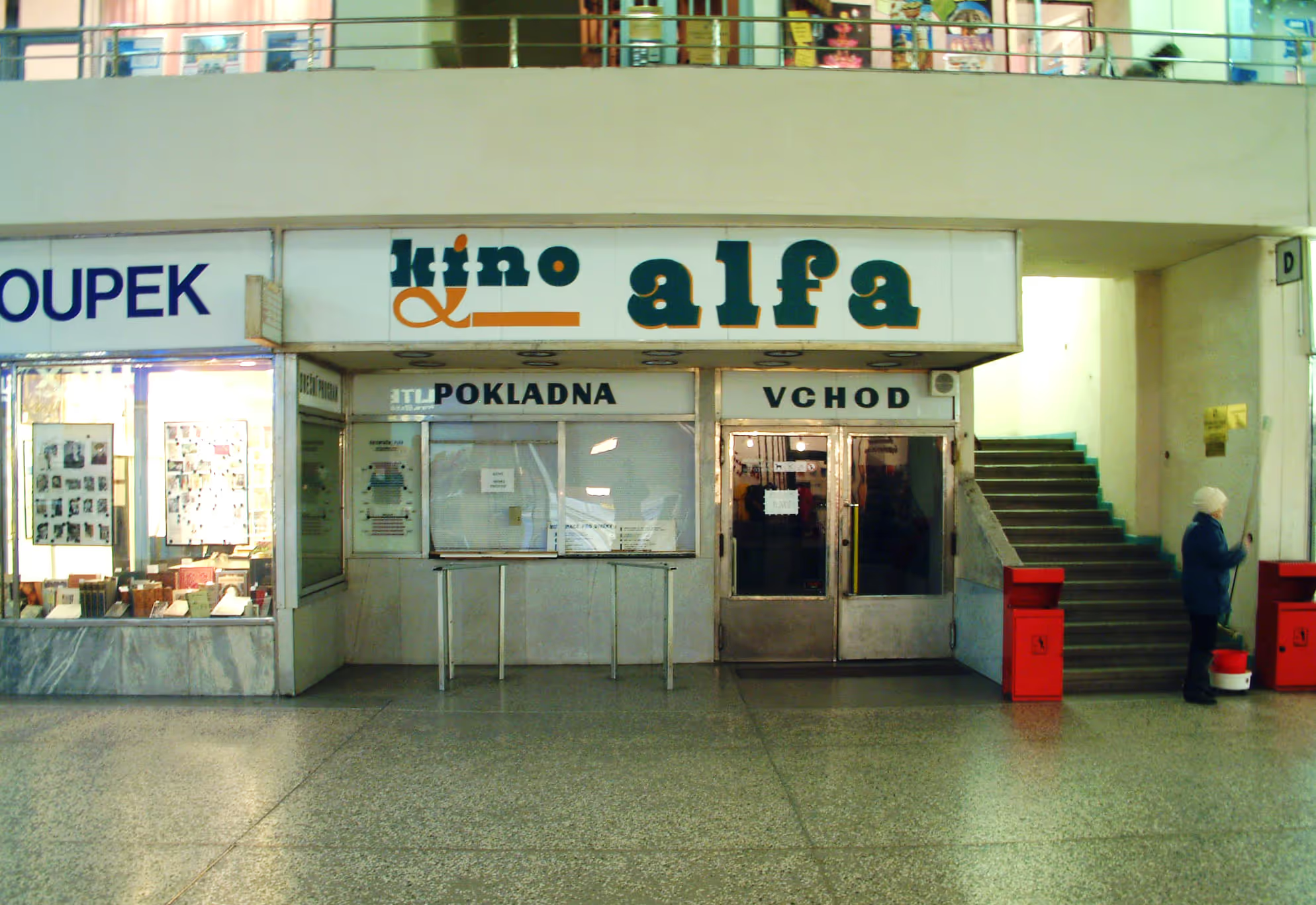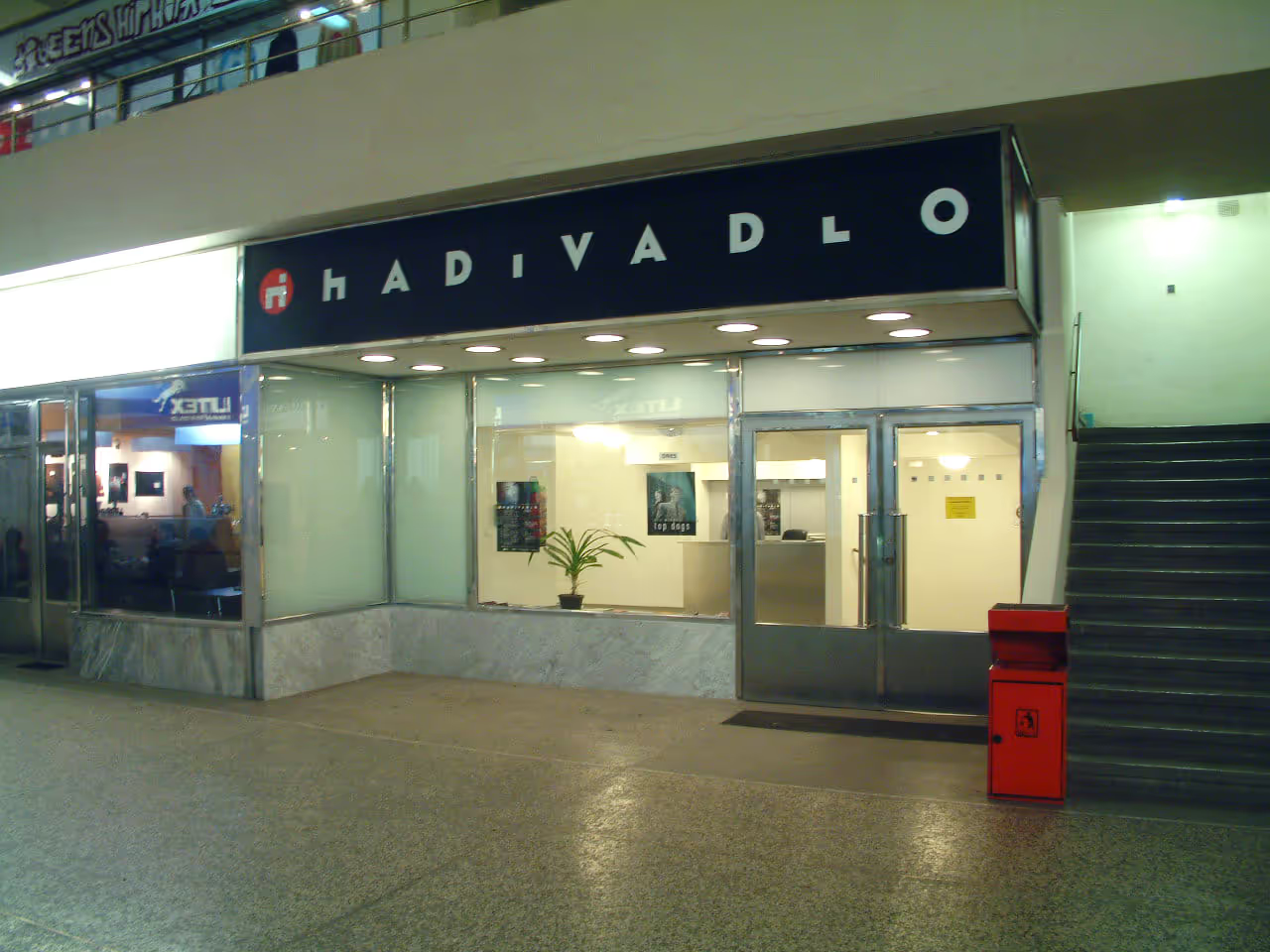history
Since its beginnings, dating back to Prostějov's 1970s, HaDivadlo has been building its position as one of the leading alternative theatre scenes, through which a number of prominent personalities have passed through.

Discover the history and mission of HaDivadlo
1974
The Hanák Theatre was founded in Prostějov by an official decision. In the same year, director Svatopluk Vála was accepted into its management and Josef Kovalčuk as dramaturg, organisational secretary and technician. Members of the former Válov Studio of LŠU became the basis of the acting ensemble, supplemented by amateurs, mainly students, and guest actors (from Olomouc and Uherské Hradiště).
1977
The ensemble won the opportunity to leave the peephole stage and relocate to the irregular space of the lecture hall of Kotěrov's National House. A permanent acting ensemble is formed (Miloš Černoušek, Miloslav Marsálek, Irena Hýsková, Jan Kohut).
1978
The acting director and playwright Arnošt Goldflam becomes a member. Director Vála creates his production triptych Ekkikléma — Dispatches on Wheels — Chapliniade (1977—79). Goldflam is staging Kovalchuk's scripts Comedy about a terrible murder in Sviadnov's tavern L.P. 1715, or Ondráš or Life from Lilac Velvet.
1979
HaDivadlo (a hitherto unofficial acronym expressing sympathy and connection with the non-traditional poetics of studio theaters) finds itself almost before cancellation. Thanks to the response of the spectators and the respect of the professional public, this intention of the official structures was not realized. Later, HaDivadlo was attached to the Brno State Theatre and together with the Theatre on a String became its experimental stage.
1982
The acting ensemble is changing. Here come Barbora Plichtová, Hana Müllerová, Břetislav Rychlík, Ján Sedal, and a little later Iva Klestilová. Svatopluk Vála is leaving.
1985
The situation in Prostějov became untenable for HaDivadlo due to the reservations of the official authorities, so he moved to Brno. He symbolically concludes his ten-year tenure in Prostějov with a festival of his productions, guest performances by related theatre groups and the premiere of a production of Fragments from an Unfinished Novel. The Bedřich Václavek Education and Science Club becomes HaDivadlo's first headquarters in Brno. Throughout the 1980s, productions such as: Journeys, Today for the Last Time, Daughters of the Nation, No Tragedy or Trial are produced.
1988
HaDivadlo is moving to the Cultural Centre in Shelepova Street. Several years of tendency and effort to express themselves as openly as possible politically and artistically resulted in a joint project of the publicist theatre Rozrazil and the Theatre on a String. With this project, he wants to directly participate in the transformation of social and political conditions. Despite several bans and threats of liquidation of both sets, Rozrazil was reported from October 1988 until November 1989.
1989
On November 17, during the performance of Rozrazil in Prague's Junior Club Na Chmelnici, the actors bring a student beaten up on the National Square to give the first public testimony. The next day, the two groups at the time of the beginning of the afternoon performance — at 4 pm — were the first theatres in the republic to declare a strike. This is immediately followed by other civic as well as theatrical activities involving them in the November coup.
1991
After a difficult search, HaDivadlo finds a new space — a hall in Sukova Street, which is christened as the Cabinet of Muses, which is also the name of the new art program. Director Jan Antonín Pitínský participated in its creation and thus the connection between HaDivadlo and the Ochotnický krůžk takes place. The first theatrical premiere in the new space is Ladislav Klíma's Human Tragicomedy (adapted by Miloš Černoušek, directed by Arnošt Goldflam), which became one of the most important events of the Czech polistopade theatre. In addition to production work, many other activities appeared in the program of the Cabinet of Muses — literary and musical café, exhibitions, author readings, discussions, art and paratheatrical events, shows and performances of related ensembles, publication of magazines and publications, dances of the last day, etc. HaDivadlo also comes to the Cabinet with a number of new faces that have appeared in the ensemble gradually since the end of the 1980s: Mariana and Hynek Chmelařovi, Michaela Maláčová, Naďa Kovářová. From the Ochotnice ring next to Pitínský Marie Ludvíková, playing manager Milan Sedláček, playing musician and composer Martin Dohnal, freely cooperating architect, stage designer and actor Tomáš Rusín, M. Zavadil, J. Ludvík, Štěpán Rusín and others. The poet, lyricist and rock musician Karel David becomes the manager, actors Johana Halounová, Dana Poláková, G. Řezníček come from the theatre schools.
1992
Director Pitínský leaves, and later also director Goldflam. Perhaps the most popular production in the history of the troupe, the retro-musical Hvězda na vrva under the direction of Karel David, is produced.
1996
The artistic director is David Jařab together with Iva Volánková (Klestilová). Luboš Balák becomes the new dramaturge after the departure of Josef Kovalchuk. The ensemble includes important actors from among recent graduates of JAMU: Marek Daniel, Pavel Liška, Josef Polášek and Tomáš Matonoha.
1999
After a brief period in which Břetislav Rychlík, Janoš Krist and Miloš Černoušek took over as artistic director, director Jiří Pokorný becomes artistic director, who bases his artistic vision of the theatre on searching and staging contemporary Czech and foreign dramatic texts.
2004
HaDivadlo moves from the Cabinet of Muses to a former cinema in Alpha Passage. After the departure of Jiří Pokorný, Valeria Schulczová, the current economic and organizational head, has briefly held the post of artistic director. In June, one of its founding members, Josef Kovalčuk, becomes the head of HaDivadlo after years. Oxana Smilková becomes the tribal director and the director and dramaturge Ondřej Elbel.
2005
Luboš Balák (artistic director) and Ondřej Elbel (director and dramaturg) win the audition for the new artistic leadership. New actors — Helena Baráthová, Kamila Kalousová (Valůšková), Václav Neužíl and Jiří Hájek join. A number of new productions are being created, especially Luboš Balák's author's projects, and a new space is created for chamber productions, the so-called. Studio. The pivotal dramaturgical project of this period is the cycle Metamorphoses of the 20th Century, which attempted to reflect the individual decades of the passing age and produced a number of remarkable productions.
2007
The tribal director becomes Marián Amsler.
2010
After the departure of Luboš Balák, Marián Amsler takes over the post of artistic director. Amsler collaborates with dramaturge Jan Havlica and later after his departure with dramaturgy and playwright Anna Saavedra. During Amsler's tenure, HaDivadlo established close cooperation with Prague's Letí Theatre and the Centre for Contemporary Dramatics. As part of the residency programs for contemporary authors, Viliam Klimáček's plays I Am Kraftwerk are featured in HaDivadlo! , Secret Message from Anna Saavedra's Planet of the Mothers and Years 90: Love, Punk and the Immensity of Ondřej Novotný.
2012
Dramaturge Jan Havlice is leaving. Marián Amsler begins to collaborate with dramaturgy and playwright Anna Saavedra. The dramaturgical cycle The End of Civilization is created, which ends with the Apocalypse Now festival. In Amsler's era, the dramaturgy of the theatre leans significantly towards staging texts of contemporary playwrights mainly of German provenance, by authors such as Falk Richter, David Gieselmann, Marius von Mayenburg.
2014
Amsler completes her artistic career at HaDivadle with the production Expulsion of Gerta Schnirch and leaves at the end of the year.
2015
The artistic director is Ivan Buraj, who has already presented himself in HaDivadlo with the author's production of Kreatura and the production of the author's transcription of Kafka's Chateau with the subtitle (glow of integration).
Current artistic directors
Currently, the artistic leadership of HaDivadlo is held by a three-member collective consisting of Jana Vaverková, Jan Doležel, and Justina Grecová, who run the theatre in a non-hierarchical manner. In 2025, they succeeded the former artistic director Ivan Buraj, following his ten-year tenure.
%20(2).jpg)

Alfa Passage
HaDivadlo is currently located in Alfa Passage, an important architectural focal point of the Brno city centre and has gradually become home to several cultural institutions, gastronomic establishments and shops.
HaDivadlo moved to the Alfa arcade, specifically to the former premises of the Alfa cinema, at the beginning of 2004 and presented its first premiere there on 14 January 2004. It was a production of Heroes by the then artistic director Jiří Pokorný and the author's collective of the theatre.
The oldest productions in the repertoire of HaDivadlo that were produced in the Alfa Passage are Doma u Hitlerů or Stories from Hitler's Kitchen by Arnošt Goldflam, The Indian in Danger directed by Jiří Havelka, Maryša directed by Lukáš Brutovský and The Expulsion of Gerta Schnirch directed by Marián Amsler








